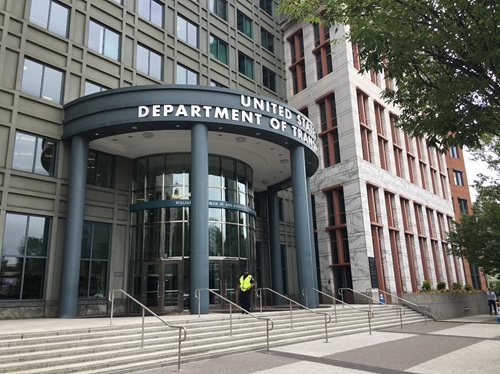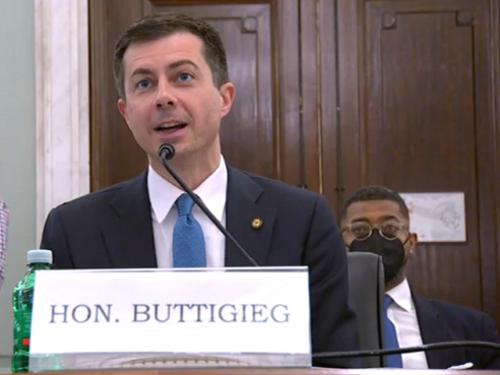U.S. Department of Transportation Secretary Pete Buttigieg (seen above) sketched out his agency’s “top priorities” in relation to proposed fiscal year 2023 spending in testimony before two different Senate committees over the past two weeks.
Before the Senate Committee on Appropriations on April 28, Buttigieg highlighted seven key FY 2023 USDOT spending priorities.

“Safety remains our top priority [with] the budget including funding to help address the crisis of deaths on America’s roadways, as outlined in our National Roadway Safety Strategy,” he said in his testimony. “That includes $3 billion for the Highway Safety Improvement Program.”
Other key initiatives include:
- A total of $4 billion for its Rebuilding American Infrastructure with Sustainability and Equity or RAISE discretionary grants program and its new Multimodal Projects Discretionary Grant or “Mega” program. Through both of those programs, Buttigieg said USDOT would “support transportation projects that transform communities so that their residents no longer need to rely on bridge, tunnel, and port infrastructure that hasn’t seen major updates in decades or even a century.”
- Some $23.6 billion for the Federal Aviation Administration to “enhance aviation safety, combat the effects of aviation on the climate, and improve our nation’s infrastructure.”
- A $4.5 billion investment in Capital Investment Grants to advance 15 major transit projects that shorten commutes, increase access to jobs, and reduce congestion on U.S. roadways.
- Investing $17.9 billion to “reverse decades of underinvestment in intercity passenger rail and make fast, reliable train service available to more people.”
- Investing $1 billion to build out a nationwide network of electric vehicle chargers, so Americans in every part of the country have access to electric vehicles.
- Establishing “ambitious” new fuel efficiency standards to save U.S. household hundreds of dollars in fuel costs while preventing the emission of 2.5 billion metric tons of carbon dioxide.
- Dedicating $111 million to “significantly enhance” the transportation capacity of “disadvantaged communities,” along with $350 million invested in a new grant program for rural communities.
“We understand that the tremendous opportunity we’ve been given to help modernize our country’s infrastructure comes with a profound responsibility to use taxpayer dollars efficiently and wisely – and to make resources more accessible to state and local governments so they can build good projects,” Buttigieg explained to the Appropriations Committee.
“This type of infrastructure transformation only happens at most once every generation, and it only happens if we work together,” he said.

He made similar comments in testimony before the Senate Committee on Commerce, Science, and Transportation on May 3.
“Another urgent priority is addressing the pandemic-driven supply chain disruptions and accompanying inflation, while also ensuring the nation’s supply chains are resilient into the future,” he said. “We’ve made available an unprecedented level of funding to modernize America’s port infrastructure – all designed to help move record amounts of goods more quickly, and to stem the rising costs of shipping.”
Buttigieg added that USDOT’s proposed FY 2023 budget of $142 billion includes $36.8 billion in advance appropriations provided by the $1.2 trillion Infrastructure Investment and Jobs Act, enacted in November 2021, which should further help his department achieve its top near-term priorities.
“To keep making progress on supply chains to help move goods faster and fight inflation, we will invest a total of $680 million to modernize ports, $3 billion to improve the roadways that carry the majority of America’s freight, and a total of $1.5 billion for CRISI [Consolidated Rail Infrastructure and Safety Improvements] grants to improve freight rail,” he noted.
“That’s just a sample of the improvements the American people will experience when they drive, fly, ride, and shop, as enhancing our transportation systems directly helps lower the transportation costs of goods and services,” Buttigieg said.
 Top Stories
Top Stories
USDOT Issues $1B in Local Road Safety Funding
January 2, 2026 Top Stories
Top Stories

